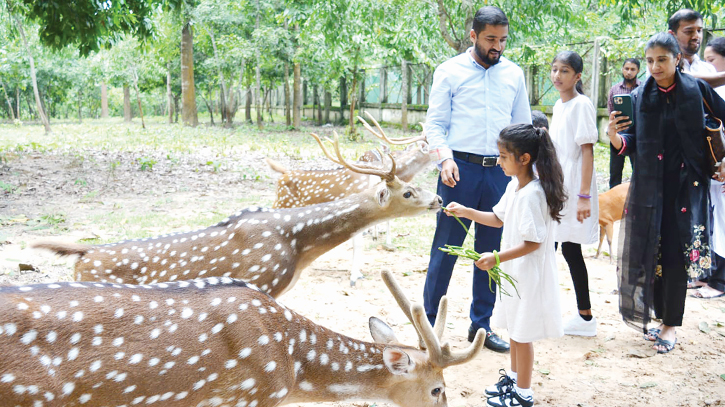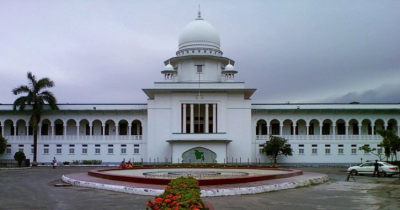
A kid is seen feeding green leaves to deer at the Bangabandhu Sheikh Mujib Safari Park, located in the heart of Dulahazara Union in Chakaria, Cox’s Bazar. Photo: Messenger
The Bangabandhu Sheikh Mujib Safari Park, situated in the heart of Dulahazara Union in Chakaria, Cox's Bazar, is witnessing a remarkable surge in its animal population.
Notably, this increase is not due to external acquisitions but primarily through successful breeding programs within the park itself. This positive trend is extending even to rare species, attracting significant interest from tourists.
Park authorities attribute this success to the provision of a conducive habitat within the park, facilitating natural breeding behaviors among its diverse inhabitants. Recent reports from the Safari Park sources reveal notable instances of births, including that of the Indian bison, locally known as Goyal, and a litter of wild boar cubs. Additionally, the park celebrated the birth of three cubs to a pair of black bears, a species considered rare within the country.
Confirming these developments, Park Supervisor Mazharul Islam elaborated on the measures taken to ensure the well-being of the newborns and their mothers. With the addition of three bear cubs, the park's black bear population has now reached 21 individuals. These cubs, yet to open their eyes, are currently under the care of their mother in the quarantine facility of the wildlife hospital. Precautions such as separating pregnant mothers a month before delivery are undertaken to safeguard the vulnerable cubs from potential threats.
Bears, classified as mammals, exhibit distinct physical characteristics, including a robust build, short legs, and a characteristic long face adorned with dense fur. Their varied colorations range from black to brown and even blue. Notably, the black bear, one of the two bear species found in the country, faces a declining population and primarily inhabits the hilly regions of Sylhet and Chattogram.
Highlighting the broader spectrum of wildlife flourishing within the park, Islam mentioned the increasing presence of Indian tigers and wild boars. The park's diverse fauna extends beyond mammals to include rare avian species like peacocks and ostriches, acquired through international exchanges, further enriching the park's biodiversity.
Visitors to the Bangabandhu Sheikh Mujib Safari Park are not only treated to captivating sights of these animals but also have the opportunity to learn more about them through educational displays and information provided at the park. As the animal population continues to flourish, the park remains a popular destination for both local and international tourists, offering a unique and enriching experience for all.
In essence, the Bangabandhu Sheikh Mujib Safari Park stands as a beacon of conservation success, where careful stewardship and a commitment to providing a nurturing environment have led to the flourishing of diverse wildlife populations.
Recent births include Indian bison, wild boar cubs, and rare black bear cubs. With thriving wildlife and educational opportunities, the park attracts local and international tourists, showcasing Bangladesh's natural splendor.
As the park continues to expand its breeding programs and conservation efforts, it remains a captivating destination for nature enthusiasts and conservationists alike, offering a glimpse into the beauty and resilience of Bangladesh's natural heritage.
Messenger/Tareq








